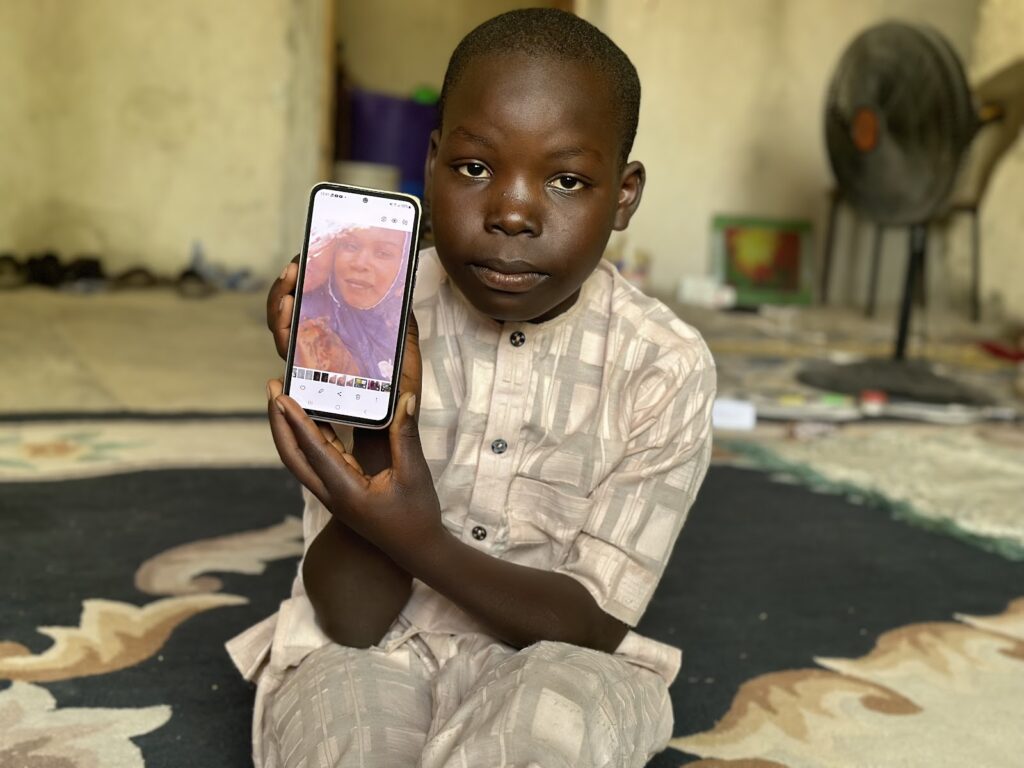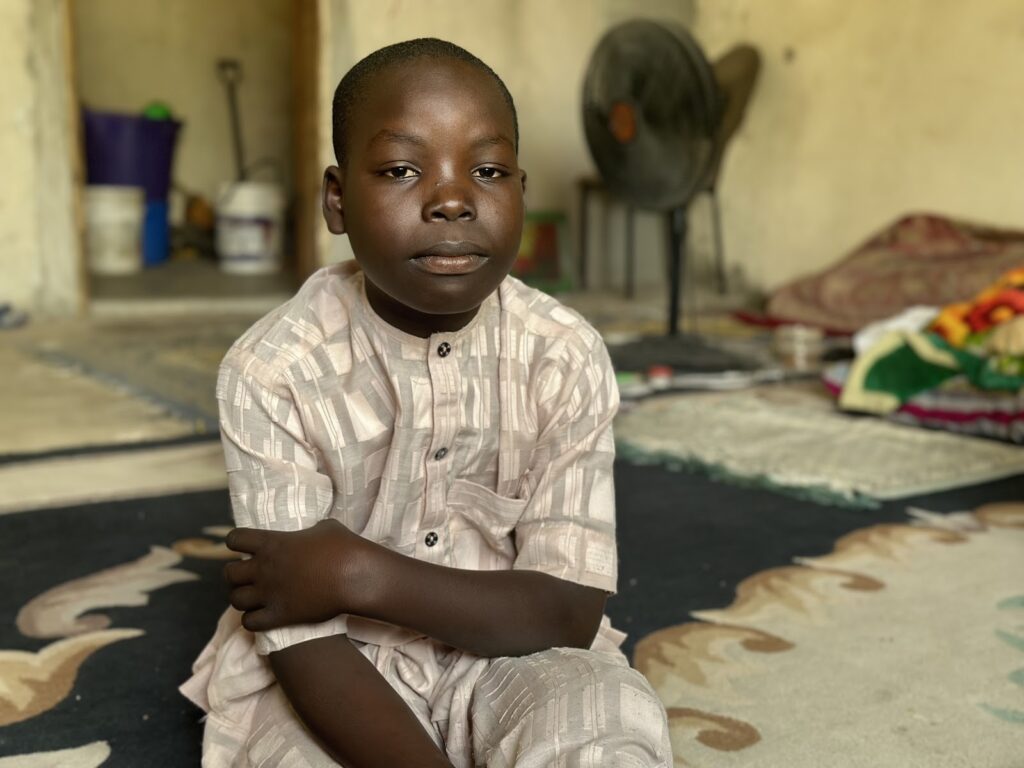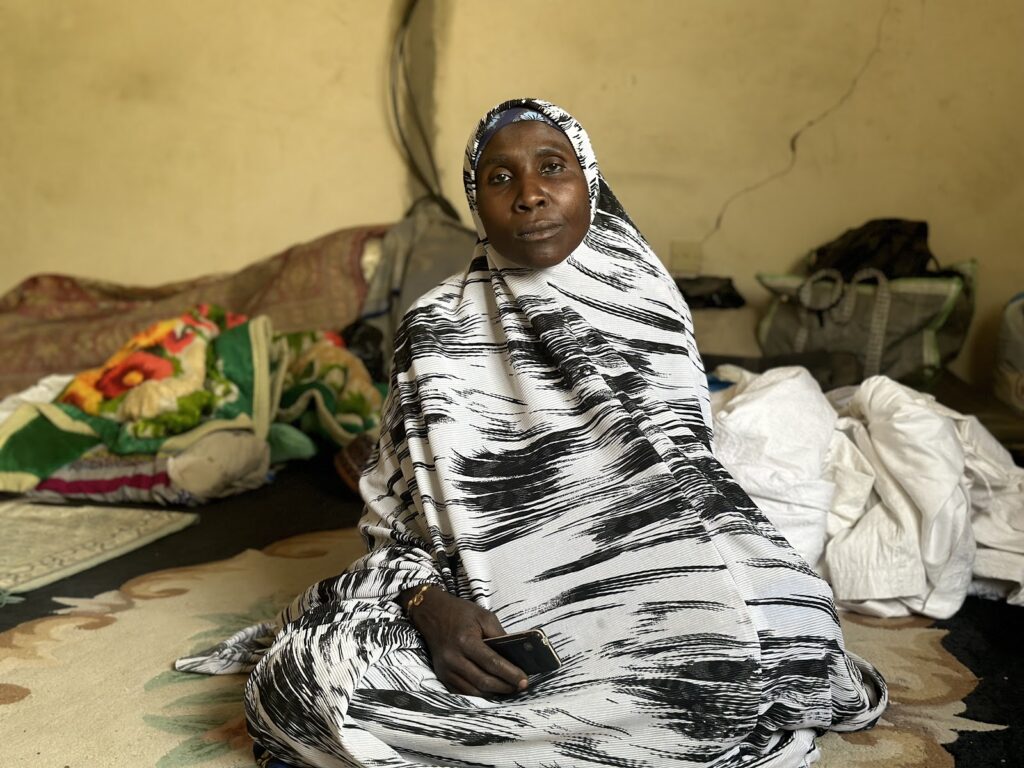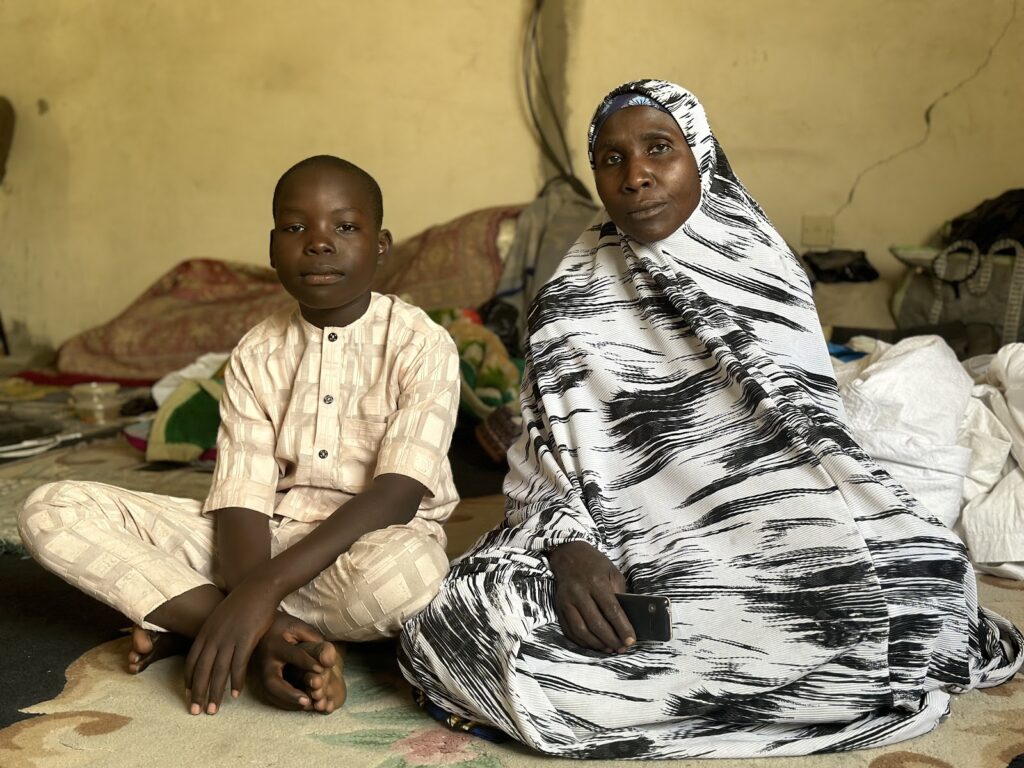What Does War Do To A Boy?
Ten years ago, Amir’s parents were arrested at the peak of the Boko Haram insurgency in Nigeria’s northeastern region. He was three. Now, he is 13, out of the orphanage, and living with his grandmother. What has been the consequence of war for him?
It is 2014, and he is on a bus with his mother and other families, travelling to Gombe for a wedding. They have arrived in the city but not the house. They have come from Yola in Nigeria’s northeastern region. Suddenly, they are stopped by members of the Nigerian Army. The grown-ups talk to the armed men. One thing leads to the other and the Army is leading away his mother and two other women. He and the other children are shoved into the embrace of a slightly older child – what was her name again? Fatima, or some such name. He doesn’t quite catch it. It is the last time he ever sees his mother.
The memories came to him in dream-like bursts. They seemed so unreliable that he convinced himself they were figments of his imagination and not recollections from things that actually happened. Still, at the orphanage, when anyone asked him where he was from or how he ended up there, he offered them this story, thinking at the back of his mind that he was lying and feeling guilty. But he had no other story to give them. Amir is now 13, and when he learned during HumAngle’s interview with him and his grandmother that this memory was accurate, he was filled with child-like wonder.
“All this time, I thought I was lying whenever I told that story,” he says. “It’s strange. To think I was right.”
It was a wonder that he had this memory. Though by all accounts an unusually intelligent child, he was merely three and a half years old when the incident occurred.
But why did it occur in the first place? The reason can be traced back to his father going missing months before. But it can also be traced back to that day in Maiduguri in 2009 when the Boko Haram terror group declared war on the Nigerian state.
For the sake of brevity, this story will go with the former.
Genesis
When Boko Haram first began their campaign through radical preachings, Amir’s parents, Bako and Hafsa, were followers of the then founder, Muhammad Yusuf. In 2013, however, when the group became violent, Bako fled, moving his wife and son to nearby Yola, then went away to faraway Sokoto for work. Many early followers of the group fled in this fashion after the uprising.
Shortly after, members of the vigilante group showed up at Bako’s house in Yola looking for him. They had tried tracing him in Sokoto but did not find him. It was now 2014, and the terror group was at the height of its violent campaign, capturing towns in rural areas, killing the occupants, displacing thousands and thousands of people, and detonating bombs at major locations all over the country. As the military tried to contain the crisis, many young men from Borno State, the birth home of the terror group, were being profiled by the authorities as insurgents. On many occasions, these people were detained. Those who had once expressed allegiance to the group stood no chance; they faced a crackdown too.
According to Bako’s mother, Fatima Mustapha, whom everyone called Ya Fati and who was never a follower of the group, the vigilante group showing up like that at their home terrified his wife. They were people they had known and lived with for years, and so when suddenly it seemed they had turned on them, it unsettled her.
“She was really rattled,” Ya Fati tells me.
So when a wedding came up in a different state, she was determined to attend and get away from her home. She went with Amir, her only child.
It was during the trip that the Army took her at a checkpoint. It has been ten years now, and Hafsa is still in detention. HumAngle understands from interviews with Ya Fati and past inmates that Hafsa is being held at the Wawa military barracks in Kainji, Niger State, North-central Nigeria.

Amir’s memory of the days after that arrest was understandably hazy. Ya Fati explains that the boy and other kids were transported to the military headquarters in Yola, the capital of Adamawa, for about three months before they were taken to an orphanage still within the city. He spent the next ten years there.
“When we arrived, they asked us questions, but we didn’t know the name of our town,” he tells me one February afternoon in Maiduguri.
“Then they asked our names. I said mine was Amir, and they asked my father’s name. I didn’t know, but they kept asking me to remember. Finally, I said my last name was Mohammed. Then, they took us in, and that was it.”
Amir is an impressive boy. His recollection of events is precise most of the time. When memory fails him, he admits it. He even speaks a few words to me in English, in an effort to impress, and I ask how come he can speak the language.
“I attended school back at the orphanage,” he responds. “I was in JS2 [second year of secondary school] when I left.”
He would like to become a police officer in the future, he says.
The UN Children’s Fund (UNICEF) notes that about 1.4 million children are affected and displaced by the Boko Haram insurgency in Nigeria. From Amir’s account, all the children in the orphanage – numbering at least 30 – were there because they had been displaced either directly or indirectly by the insurgency.
What he remembers most from his time at the orphanage is the frequency with which hunger pangs would grip his stomach. It was a feeling he came to become accustomed to.
“The woman who ran the orphanage was cruel,” he says. “She didn’t feed us properly, and our clothes were always torn, even our uniforms. That’s how we lived.”
As he talks about the woman and how horribly she treated them, he starts to cry.
“They were supposed to give us food three times a day,” he sobs, “but the woman wouldn’t give it to us. Sometimes, she’d just give us two packets of instant noodles, and that was it. Things only got better when they replaced her with another woman.”
The premise of being put in an orphanage is that one is an orphan. Even as a child, Amir knows this. But it did not stop him from asking about the whereabouts of his parents.
“I never heard anything about my parents. Whenever I asked, they’d just tell me they were dead… I didn’t even know my mother’s name. There were times when I cried, calling out for my mom and dad. But the people there would just tell us we’d never leave and that our parents were dead.”
The forgotten sibling
Due to the poor treatment at the orphanage, many of the children hoped to be adopted. And this did happen once in a while. During the rounds, the children would be lined up neatly as the visiting prospective parents inspected them and picked someone. There was a condition to the adoption, however. If the child’s real parents were found, then the adoptive parents would have to return the child. Amir himself came close to being adopted once, but he cried and protested, insisting that he only wanted to be with his biological parents.
He recalls one particularly heartbreaking story. A boy his age had been separated from his baby sister at the orphanage when some parents adopted her.
“He would cry all the time, saying he just wanted to be back with his sister.”
The sister is all grown up now. The tragedy, however, was that when she came to visit years later with her adoptive parents, she could not remember him anymore. He had spent all those years in agony over when he would see her again, and when it happened, it was no use because she had forgotten him.
One of the consequences of the insurgency is this: the value of remembering is taken away from people like that boy, forever altering their experience of family.
There was another boy named Muhammad at the orphanage who struggled more acutely than others due to loneliness and hunger. He was Amir’s friend. One day, he ran away from the orphanage, hoping to find his parents. The home found him, however, and brought him back. He was taken into an isolated disciplinary section, where kids are promised information about their birth parents on the condition of good behaviour. Though it must have been a sad experience for Muhammad, it turned out for the best for Amir, because Muhammad returned to the home to tell Amir that he had found his grandmother. Amir did not even know he had a grandmother before then.

For his good behavior, Muhammad had been shown pictures of his mother and a few other women, and made to speak to his mother over the phone. It was over the phone call he learned that one of the other women in the picture was Hafsa Usman, Amir’s mother, and that the other woman was his grandmother.
“He told me about my dad and even showed me a picture of my mother, his mother, and himself. He said my mother was still in prison and hadn’t been released. He called my grandmother, and we spoke. She spoke in Kanuri, and he translated for me in Hausa. She asked me when I was coming home, and I told her I didn’t know. After a while, they started investigating my situation and asked me if I wanted to go home, and I said yes, of course.”
It didn’t happen immediately. There were several rounds of them promising him he would go home and it not coming to pass.
Tragedy is a snowball
But the tragic wind did not stop blowing after it knocked Hafsa into prison and Amir into an orphanage. It reached Ya Fati, too. She had not had the best of decades. During the ill-fated trip that separated Amir from his mother, she had been in touch over the phone with Hafsa, calling at intervals to know where they were and how the journey was going. Unfortunately, this would eventually play against her. When the military searched Hafsa’s phone when they took her away, they saw that Ya Fati was the last person she called.
Later, as Ya Fati mourned her father, who had passed seven days before, four soldiers came looking for her.
As she sat in her late father’s compound, within the walls where she grew up, struggling to come to terms with the finality of his death, soldiers marched in at midnight. They said they had a few questions to ask her at the station, and she would return home immediately after in the morning. She believed them and went with them. It was nearly a year later that she was finally freed.
They took her to Giwa barracks, a notorious military detention facility in the heart of Maiduguri, where people suspected of being Boko Haram members are usually kept. That night, she slept in the cell without being questioned or briefed about what her offence was. When the day broke, the proceedings started.
“They registered my name and interrogated me,” she remembers. “They wanted to know where Bako was.”
By this time, Bako had been arrested for over eight months, and so the interrogation seemed confusing and even pointless, especially as she had not committed any crime.
Beyond their phone call history, she had also visited Hafsa once before, and for some reason, the officers found that suspicious even though she was, in fact, her daughter-in-law.
“They wanted to know why I visited Hafsa. I don’t even know how they knew that I had visited Hafsa. I explained that she had just given birth and unfortunately lost the baby, so I went to check on her and see how she was doing.”
Despite answering all the questions directed at her and there being no apparent reason to believe she was guilty of any crime, Ya Fati was not released for up to one year.
Life in the facility was dehumanising, she says.

“We didn’t have proper toilets. There was just a container that couldn’t hold the waste for so many people, especially with women and children using it. Sometimes, the waste overflowed, and we had to clean it up with rags. It would even spill over to where we slept. There were no lights, and the room was tiny and crowded. We couldn’t move freely.”
Worse, she did not know what she was being detained for.
Absolution came sometime in 2015 after former President Muhammadu Buhari won the election.
“Kashim Shettima [then governor of Borno State] visited the barracks, and they released about 140 of us,” she recalls.
Shortly after, Ya Fati received word from some parents who had gone to the orphanage to find their own child that Amir was seen there too. She immediately wanted to confirm and, if possible, fetch him, but her children thought it was a bad idea.
“They were scared because of my experience with prison because of the whole situation.”
Years later, through the help of a human rights activist, she confirmed that Amir was truly at the orphanage. Together, they began the slow task of trying to get him out. They tried to contact the state government, the International Committee of the Red Cross’s family linking section, and even lawyer associations. Each attempt seemed promising at first but would quickly become futile whenever the fact that Amir’s mother was in detention came to the fore. It was a difficult stench that did not go away. Another challenge was that Amir would not be able to identify her since he did not know her even though she could identify him anywhere.
Ya Fati got an ID card and other documents she thought would help establish the link between her and her grandson, and for a while, it seemed pointless. But one day, she received a phone call from an orphanage in Maiduguri, asking her to come in the next day. She went there early in the morning, and there was Amir, a spitting image of his mother, sitting there and waiting for her.

At the time of the interview in February, their reunion was five weeks old. Amir was learning how to live with family, a component that had been missing in his life for a decade. They are both grateful for the reunion because neither thought it was possible.
Still, one important issue remains: Hafsa Usman is still in detention. Ya Fati feels this is unjust because she never took up arms against the state.
“She’s been imprisoned for ten years! It simply isn’t fair. We were told they were taken to Gombe and that a judge even reviewed her case and declared her innocent, ordering her release. But she is still being held.”
HumAngle was able to trace another woman who was detained at the Wawa military barracks during the same time and showed her a picture of Hafsa. She confirmed that Hafsa was indeed being held there and that she was still there when she was released two years ago.
The second issue of concern for Ya Fati is Amir’s education.
“He’s a bright boy, and I want him to have a good education, including Islamic education. Unfortunately, I’m financially limited and can’t afford it on my own,” she says.
It has been an unfortunate decade for the family. Ya Fati has yet to recover from the trauma of her own detention.
Sometimes, both grandmother and grandson wonder if their lives would have turned out differently if that trip to Gombe had never occurred. Maybe, maybe not.
***
Amir gets to wear a school uniform again. A clean, pressed uniform nothing like the one he used to wear at the orphanage. His mother has finally been released, and the war has ended in as much sense as a war can be said to have ended. He has breakfast with his mother before rushing to school every morning in a post-conflict Maiduguri. His friend Muhammad is out of the orphanage, too. His grandmother is happy again. His father is never found because he died in detention, but they keep this information from Amir until he is old enough to bear it. Amir grows up and becomes the police officer he has always dreamed of becoming.
This one is a dream, alright. But Amir and his grandmother believe so much in its potency.
Support Our Journalism
There are millions of ordinary people affected by conflict in Africa whose stories are missing in the mainstream media. HumAngle is determined to tell those challenging and under-reported stories, hoping that the people impacted by these conflicts will find the safety and security they deserve.
To ensure that we continue to provide public service coverage, we have a small favour to ask you. We want you to be part of our journalistic endeavour by contributing a token to us.
Your donation will further promote a robust, free, and independent media.
Donate HereStay Closer To The Stories That Matter





